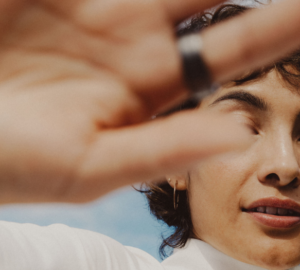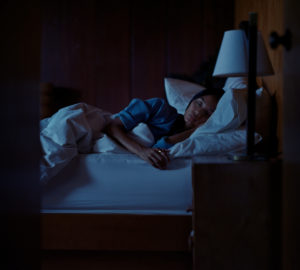- About 1 in 4 adults in the U.S. experience seasonal allergies — which seem to get worse due to environmental factors.
- Seasonal allergies can affect sleep by causing breathing disturbances, snoring, frequent wakeups, and more.
- Oura members can use Tags to better understand how allergies impact their breathing regularity, nightly wakeups, and overall sleep quality.
Can’t sleep due to a stuffy nose, itchy eyes, or persistent cough? You’re not alone. About 1 in 4 American adults experience seasonal allergies, according to the CDC.
Plus, if you feel like your allergies are worse this year (or if it’s the first year you’ve experienced them!), you might be right. Environmental factors such as warming temperatures are likely to blame for exacerbating seasonal allergies due to tree pollen, mold, and other allergens.
According to NBC News, the pollen season now lasts about three weeks longer than it did 30 years ago, and the “sheer amount of pollen in the air has exploded,” too.
Oura member data aligns with this trend as well: There was a 5x increase in the use of the “Allergies” tag from January to May 2024, a much sharper spike than prior years.
There’s relief in sight, though. Keep reading to learn more about seasonal allergies and symptoms, why they seem worse at night, and how to sleep better with allergies.
Allergies, Defined
Allergies occur when your immune system reacts to a substance such as pollen, dust mites, mold, or pet dander — known as allergens. Allergens can trigger allergic reactions that include sneezing, congestion, and itching. Seasonal allergies are also known as allergic rhinitis, also known as hay fever.
When you come into contact with an allergen, your immune system sends a histamine signal to immune cells in your skin, lungs, nose, mouth, gut, and blood. Histamine, in turn, causes allergy symptoms, which cause increased blood flow and inflammation in the area affected.
Are Allergies Affecting Your Sleep?
These are a few common allergy symptoms that might point to allergies affecting your sleep.
1. You find it hard to fall asleep.
A stuffy nose and itchy eyes aren’t exactly conducive to a restful night of sleep. If it takes you longer than 20 minutes to fall asleep, it could signal that you’re either being kept up by allergies.
| Member Tip: See how long it takes you to fall asleep by checking out your Sleep Latency contributor in the Sleep Tab in your Oura App. |
2. You’re snoring more than usual.
Allergies can cause nasal congestion and inflammation, which forces you to breathe through your mouth. Mouth breathing often causes snoring because it causes the uvula and soft palate in your mouth to vibrate, producing an audible noise.
If you’re woken up by snoring or your partner cites this as a sleep interruption, allergies might be to blame.
READ MORE: Does Mouth Taping Help With Snoring?
3. You wake up frequently at night.
Allergy symptoms tend to worsen at night (more on why this happens later). As you snooze, your body might be triggered by an allergen like dust mite, thus producing histamines that cause you to itch, cough, or even sneeze in the middle of the night.
| Member Tip: Check your nighttime movement graph to gauge how often you’re tossing and turning at night and how it’s impacting your sleep quality. |
4. You wake up gasping for air.
Severe allergies make symptoms of sleep apnea worse. Sleep apnea, a common sleep disorder that often goes diagnosed, can cause symptoms such as snoring, brief stops in breathing during sleep, and waking up while gasping or choking. Your allergies might be making your sleep apnea worse. If you suspect this might be a cause, see your healthcare provider.
READ MORE: Sleep Apnea, Defined — And How to Treat It
5. You feel more tired than usual or groggy during the day.
A study published in the Journal of Allergy and Clinical Immunology found that seasonal allergies and lower sleep quality can negatively impact learning ability and productivity at work or school.
All of the above symptoms — e.g., frequent wakeups, delayed sleep latency, and breathing difficulties — can reduce sleep quality and lead to tiredness that persists throughout the day, regardless of how much sleep you get.
READ MORE: Why Do I Wake Up Tired? How to Feel More Alert in the Morning
Common Allergens That Impact Sleep
- Pollen: A common trigger of seasonal allergies, pollen is a yellowish powder that stems from trees, grass, or weeds. It typically travels by the wind, birds, or insects, which means you’re more likely to be affected by it when the pollen count is high and the temperature is cool and windy.
- Dust mites: Dust mites are microscopic creatures that thrive in warm, humid environments, such as bedding, mattresses, and upholstered furniture.
- Pet dander: Shed by animals with fur, pet dander can affect you even if you’re not allergic to your pet per se by trapping other allergens like pollen and dust mites.
- Mold: Mold spores grow in damp areas like bathrooms, basements, and kitchens. Inhaling mold spores can be dangerous, as it may lead to respiratory issues and allergic reactions.
- Household products: Cleaners, air fresheners, and personal care products like hairspray or perfume may contain chemicals that irritate your respiratory system and exacerbate allergy symptoms.
- Smoke: Not limited to cigarette smoke, smoke from sources such as a nice-smelling candle or a grill can affect air quality and trigger allergies.
Why Your Allergies Get Worse at Night & How to Sleep Better
Do you feel more affected by allergies at night than during the day? Here are a few reasons why that can happen.
A bedroom full of allergens
As gross as it may sound, studies show that dust mites and other allergen are commonly hidden in your bedding.
Poor air quality
Make sure to clean your air conditioning vents regularly, and consider using an air purifier to get rid of allergen particles in the air.
More evening air pollen
Pollen concentrations in the air gradually increase throughout the day. Plus, on warmer, sunnier days, air lifts pollen up and away from nose level. During the night, when the air cools, pollen can come back down to face level again.
Your sleeping position causes a post-nasal drip
When you lie down to sleep at night, gravity takes effect. Mucus and congestion from allergies in your nose drip down your throat, which can cause coughing or wheezing.
Your pet sleeps next to you
Pet dander — as well as any pollen they’ve gotten into during the day — may accumulate on your bedding, worsening allergy symptoms at night.
Histamine levels can peak at night
Studies show that mast cells (the types of cells that release histamine) are controlled by an internal clock, just like your own circadian rhythm, causing histamine levels to peak at night.
READ MORE: How Sleep Affects Your Immune System
7 Strategies to Sleep Better with Allergies

You don’t have to give up activities you love (or your pet!) to sleep better at night during allergy season. Make these adjustments to help relieve allergies and improve your sleeping environment.
1. Consider an air purifier.
Look for purifiers equipped with HEPA (High-Efficiency Particulate Air) filters to capture and remove allergens from the air effectively.
2. Clean your bedroom regularly.
Dust surfaces and vacuum your bedroom at least once a week. If you have a lot of upholstery in your home, consider switching it out to a material that doesn’t accumulate dust mites, like leather sofas or polyester bedding.
Also, optimize your laundry routine to fight allergies by using the hottest water possible, a hot temperature setting on your dryer, and a fragrance-free laundry detergent.
3. Keep your pets outside the bedroom.
It may be hard to adjust without your furry friend, but you both may sleep better with some space. If that’s a non-negotiable, try to keep their pet dander to a minimum by regularly bathing your pets and brushing their coats to remove excess allergens.
4. Elevate your head in bed.
Sleeping flat on your back can worsen congestion. Try to elevate your head with extra pillows or sleep on your side to help keep your airways open and improve airflow.
5. Shower at the end of the day.
Pollen can accumulate on your skin and hair throughout the day, especially if you have spent time outdoors. Be sure to wash off before hitting the sheets to remove it. For a sleep-inducing bonus, turn up the heat — a warm shower or bath before bed has been shown to help you fall asleep faster.
6. Take allergy meds at night.
Antihistamines, the active ingredient in allergy medications, work by inhibiting the production of histamines to reduce nasal congestion. This offers relief and can improve breathing — taking them at night can help combat the post-nasal drip for better sleep. Before taking any medication, be sure to consult with your healthcare provider.
| Member Tip: Record your allergy medication use on Oura using a Custom Tag. This will allow you to see how taking medications impacts your sleep quality. |
7. Seek medical advice.
If allergy symptoms and sleepless nights persist despite taking these measures, consult your doctor. Suffering through sleepless nights can have long-term consequences for your health and happiness.
RELATED: What’s the Best Sleeping Position for Breathing Problems?




